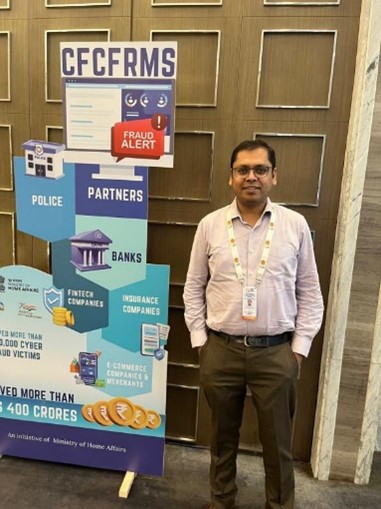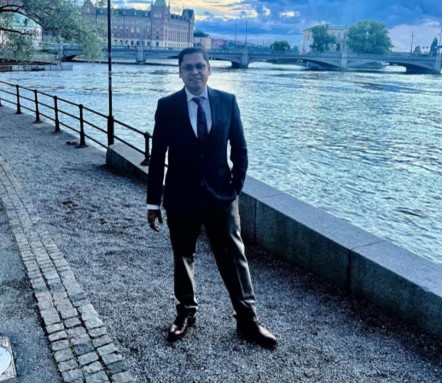Director, Department of Revenue, Government of India
Government Administration
Smarak Swain’s career exemplifies a dynamic blend of expertise and impact from
financial investigations to policymaking.
"I like financial investigation because it’s dynamic and a way to give back to society,” he reflects. “We don’t just catch tax evaders; we also catch people involved in tax crimes, money laundering, corruption and financial frauds."
I like financial investigation because it’s dynamic and a way to give back to society,” he reflects. “We don’t just catch tax evaders; we also catch people involved in tax crimes, money laundering, corruption and financial frauds.
As the Director in charge of Financial Action Task Force Cell (FATF Cell) in the Finance Ministry of India, Swain’s journey began with an altruistic angle.
From Swain’s perspective, this aspect of the job has a degree of public service.
 Smarak Swain is the Director in charge of Financial Action Task Force Cell (FATF Cell) in the Finance Ministry of India
Smarak Swain is the Director in charge of Financial Action Task Force Cell (FATF Cell) in the Finance Ministry of India
In 2020, Smarak sought a transition from fieldwork to a policy-oriented role, pursuing a Master in Public Administration at the Lee Kuan Yew School of Public Policy (LKYSPP). Despite the challenges posed by the COVID-19 pandemic, his time at NUS proved transformative.
“The Master in Public Administration programme was an eye-opener for me,” he shares, highlighting how it reshaped his approach to policy through lessons on the consultative process and project management.
Today, with a role that sees him lead the charge at the FATF Cell, Swain focuses on coordinating India’s national response to money laundering and terrorist financing. His role involves collaboration across multiple agencies and crafting policies that address evolving financial crimes.
Through his latest book, Digital Fortunes, Swain also explores intersections of digital technology and value creation, reflecting his ongoing experience with financial investigations, and how it pertains to the broader digital economy.
Below, Smarak explains how his experiences and insights have shaped his current work and the impact of his broadened roles in combating financial crime and navigating the digital landscape.
What motivated you to pursue a career in financial investigation and forensic auditing?
People often think of tax officers as just tax collectors, but we give back to the community in financial investigation! Beyond just catching tax evaders, we also apprehend individuals involved in crimes, money laundering, corruption and financial fraud.
Over time, I developed a love for number crunching and investigation.
After seven to eight years of active investigation in the field, I could switch to policymaking related to financial investigations. I joined the Foreign Tax Division of India to negotiate tax treaties but wondered how to transition from operational work to policy-level work.
In 2020, I decided to join LKYSPP. I stayed in India for a long time and attended my lectures online. I went to Singapore for only three months. Still, I had a great campus experience and learned much about policymaking, aiding my transition from financial investigation operations to policymaking.
After I returned to Delhi, I joined the FATF Cell as Director. Many agencies are involved in financial investigations, and my role seeks to encourage and increase inter-agency collaboration between agencies and regulators, to counter money laundering and terrorist financing. It involves a vast deal of macro-level work but remains relevant to my field experience.
Could you share some key responsibilities in your current role?
My team and I perform a crucial role in conducting a national risk assessment for money laundering and terrorist financing in the country. We also identify gaps in our laws that money launderers might exploit. The idea is to be proactive—if we wait until after the fraud happens, it’s too late.
 Smarak Swain’s work involves engaging with overseas FATF counterparts
Smarak Swain’s work involves engaging with overseas FATF counterpartsWe also work closely and engage with FATF based in Paris, and counterparts in other countries engaged in AML (Anti-Money Laundering)/CFT (Countering the Financing of Terrorism) policymaking. I handle administrative matters related to India’s membership in the FATF and our involvement in the Asia Pacific and Eurasian groups.
How did your experience at the Lee Kuan Yew School of Public Policy shape your career?
The Master in Public Administration programme was an eye-opener for me. Before taking the course, I focused entirely on the operational side of financial investigations— I saw myself purely a financial investigator, and my opinions used to be quite stringent.
Back then, I didn’t see the value or advantages of the consultative process, but today I know it is essential to developing policy.
If policy is not consultative and becomes a top-down process, it may not succeed in practice. Stakeholder consultation was something I learned from many case studies during my time at NUS.
Another critical lesson was project management. Planning a project, breaking it down into small steps, involving the right people, and assigning specific responsibilities to different teams. As part of this, I picked up the importance of post-implementation assessment. After implementing a project, you must assess whether the objectives have been achieved.
Today, the things I learned benefit India’s anti-money laundering and counter- financing strategies.
We regularly review numbers to understand how well any new implementation aligns with our original objectives and whether there are any unintended consequences, good or bad.
It is thanks to my time at NUS that I developed this effective approach.
Please tell us about your latest book, Digital Fortunes. What do you want readers to take away from it?
Everyone is looking at digital technology like an elephant—from different perspectives. From an investigation perspective, we generally look at issues of cybercrime, crypto assets, virtual assets, and the use of virtual assets for money laundering. But when we look closely at how to regulate these areas, we find that every country deals with them in its own way.
There are no best practices or cheat codes to investigate and understand. We realised that if we look at the elephant’s tail or the leg, that will not work. We have to understand the elephant comprehensively, and consider various angles such as macroeconomic stability, AML/CFT, tax transparency, consumer protection, market protection, and fraud prevention.
We have to look at the elephant from the top.
I tried to understand digital technology, the business models of various digital companies, and the value coming from the digital economy.
I interviewed many startup founders, venture capitalists, private equity guys, and key employees of multinational corporations in the digital era. From there, I got an excellent picture of the digital economy and how it differs from the traditional economy.
The book's first part explains how you need to think from the angle of networks to appreciate what is happening in the digital economy. The second part is about virtual assets, the frauds, which are valuable, why they are helpful, and which are fraudulent or unregulated.
I actually created a fraud risk heat map in the second part of my book! Financial investigations and understanding risk are very close to my heart. I even narrated the risks we see regarding virtual assets.
What advice would you give to NUS alumni and current students interested in following a career path similar to yours?
There are three general areas where you can get jobs in public policy: government roles, non-profit organisations or charities, and the private sector.
When you look at the private sector, who needs a director of public policy? Those working on technologies or solutions operate in areas around which there is no regulation. Regulations are coming, and you must work with the government to establish them. That is when you need a lot of public policy officials and managers.
It would be best if you targeted those companies. They are generally FinTech companies, new technology companies, or companies engaged in AI, IoT, or 5G technologies. While targeting these companies, you should develop some skillsets that are valuable to them.
Digital technology has only come about in the last 20-25 years, and governments worldwide are more reactive than proactive. But there is a complete array of technologies that need to be regulated, and you need to identify the base concept behind these technologies. You need to understand the underlying technology, the ethics behind the technologies, how to identify vulnerabilities in these technologies, and the audit process for new technologies and fintech solutions.
It would be best if you had the proper skillset to become a bridge between that company and the government. Most people in government need to understand these new technologies. Companies focus on the technology aspect and are usually relaxed about ethics. You are the one who has to form the connection between them.
You have to become the company's soul keeper. You have to tell the company how it can progress, prosper, and grow ethically and work in partnership with the government.
So those are some of the skillsets that you have to develop.
How important are continuous learning and adaptability in today's landscape for students interested in this sector and field?
It's essential that learning is something you need to do all the time.
I realised this when I attended LKYSPP. LKYSPP taught me a lot about tech regulations, which I needed to understand. New things are evolving in cutting-edge areas, including trade policy, communications policy, and energy systems.
That is where the requirement for public policy managers exists. Unfortunately, a public policy manager can become outdated within three to four years. But a public policy manager can always remain evergreen (through continuous learning).
What do you enjoy most about your work, and what drives you to explore new challenges in your field?
What I like most about my work is that I meet many interesting people almost daily. I meet people from India and AML experts from other countries, which keeps broadening my horizons.
I learn something new every day, and that helps keep me going. I'm hungry for knowledge, insights, and ideas. I also get excited because I'm in a position where I can plan something, tell my bosses, and do something for the country.
The idea that I'm doing something for the country, and even if I contribute in a small way, it can make significant changes in the future for the betterment of my people, motivates me.